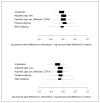A Randomized Controlled Trial of Financial Incentives for Medicaid Beneficiaries with Diabetes
- PMID: 29401049
- PMCID: PMC5798937
- DOI: 10.7812/TPP/17-080
A Randomized Controlled Trial of Financial Incentives for Medicaid Beneficiaries with Diabetes
Abstract
Background: The Medicaid Incentives for Prevention of Chronic Diseases program was authorized by the Affordable Care Act to determine the effectiveness of providing financial incentives.
Objective: To examine the impact of incentives on adult Medicaid beneficiaries' diabetes self-management using the Hawaii Patient Reward And Incentives to Support Empowerment project.
Methods: A randomized controlled trial study was conducted at Kaiser Permanente Hawaii with 320 participants (159 intervention group/161 control group). Participants could earn up to $320/y of financial incentives, distributed in the form of a debit card. Evaluation measures included 1) clinical outcomes of change in hemoglobin A1C, blood pressure, and cholesterol; 2) compliance with American Diabetes Association standards; 3) cost effectiveness; 4) quality of life; 5) self-management activities; and 6) satisfaction with incentives.
Results: No significant differences in clinical outcomes were found between groups. There were no differences in observance of American Diabetes Association standards of medical care between the intervention and control group. The project also did not show reduction in health cost. However, participants in the intervention group reported significantly higher adherence with the recommended general diet than those in the control group during the course of the study. They also reported statistically better physical health than their control counterparts at the midpoint of the study; however, the perception of increased physical health didn't sustain to the end of the study. Participants' satisfaction with incentives was high.
Conclusion: Overall, this study found no conclusive evidence that financial incentives alone had beneficial effects on improving standards of medical care in diabetes.
Conflict of interest statement
The author(s) have no conflicts of interest to disclose.
Figures


References
-
-
The Patient Protection and Affordable Care Act of 2010. Public Law 111-148, 111th Congress, 124 Stat 119, HR 3590, enacted 2010 Mar 23.
-
-
- Paradise J. Medicaid moving forward [Internet] Menlo Park, CA: Kaiser Commission on Medicaid and the Uninsured, Kaiser Family Foundation; c2017. [cited 2017 Mar 23]. Available from: http://kff.org/health-reform/issue-brief/medicaid-moving-forward.
-
- Harris MI. Racial and ethnic differences in health insurance coverage for adults with diabetes. Diabetes Care. 1999 Oct;22(10):1679–82. DOI: https://doi.org/10.2337/diacare.22.10.1679. - DOI - PubMed
-
- Wilper AP, Woolhandler S, Lasser KE, McCormick D, Bor DH, Himmelstein DU. A national study of chronic disease prevalence and access to care in uninsured US adults. Ann Intern Med. 2008 Aug 5;149(3):170–6. DOI: https://doi.org/10.7326/0003-4819-149-3-200808050-00006. - DOI - PubMed
-
- Gilmer T. Costs of chronic disease management for newly insured adults. Med Care. 2011 Sep;49(9):e22–7. DOI: https://doi.org/10.1097/MLR.0b013e318215d280. - DOI - PubMed
Publication types
MeSH terms
Substances
LinkOut - more resources
Full Text Sources
Other Literature Sources
Medical

